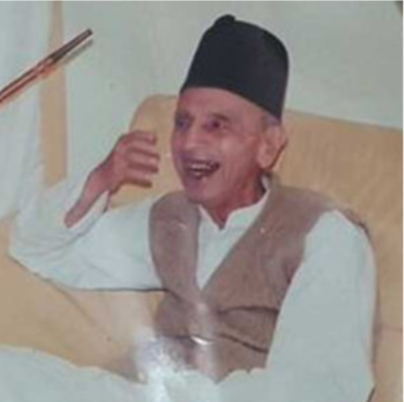The current political lineup in Pakistan is made up of individuals who do not share the same dedication to democratic ideals as the generation of democratic political stalwarts who, despite facing numerous challenges throughout their long political careers, never wavered from their principles. Nawabzada Nasrullah Khan, known as the "Father of Democracy," was a statesman from a bygone period who never wavered from the ideas of democracy and remained true to them despite suffering for his firm convictions.
He was erudite but incredibly soft-spoken, a steadfast voice of opposition to authoritarian regimes throughout Pakistan's history. Throughout his life, he maintained a sound resistance to authoritarianism and actively opposed it in all public forums. He also stood up to arbitrary inclinations wherever they appeared in Pakistan.
Nawabzada Nasrullah Khan was an old-school politician who was firmly ingrained in the conventional institution of politics. He never wavered in his conviction that in a democracy, it is primarily the people who matter and everything else is just procedure. He maintained that political operators must constantly seek the opinions of the public and keep in touch with them since failing to do so renders their job unfinished.
He was revered by succeeding military administrations who understood how adamant he was about resisting any meddling with democratic traditions because of his strongly held democratic values and beliefs. The remarkable thing about him was that despite having a five-decade political career—likely the longest of any Pakistani politician ever—he never sought out high office.
Although Nawabzada Nasrullah Khan was never considered as a conventional constituency politician and always attempted to play a part on the national arena, he was highly recognized nationwide due to his widely renowned Huqqa (hubble-bubble), dark achkan, and Turkish cap. On the contrary, he was naturally able to bring disparate parties together in support of the basics of the rule of law, the constitution, and pure democratic government. He was a compelling character who embodied the old-fashioned ideals of simplicity and tolerance. His utter incorruptibility, which was rare unde Pakistan's political context, added to his allure.
A aristocratic family's descendant from Khangarh, a very underdeveloped region of south Punjab,
Nawabzada Nasrullah was assigned to study at the prestigious Aitchison College in Lahore, which was founded to educate the children of landed aristocracy. He had an independent disposition and quickly came to detest colonial rule. In 1933, he joined the politically anti-colonial Majlis-i-Ahrar (Organisation of Freedom Fighters), which was motivated by religion. He joined the Muslim League, which was in power when Pakistan became independent, and ran on its platform to win the national assembly elections in 1952 and 1962.
Ayub Khan made his mark on national politics while it was under military rule, but he quickly grew weary of the military dictatorship. It was at this point that he famously said, "Either there is democracy, or there isn't, and there is no third situation," reiterating his firm belief in the virtue of democracy as the best form of government. Nawabzada had no choice but to continue fighting against arbitrary government for the remainder of his life. He persistently raised the red flag of resistance even when he did not have many backers.
Nawabzada didn't believe in wasting time, therefore he quickly began criticizing Ayub Khan's arbitrary authority. He didn't just express disapproval; he also started uniting the opposition groups against the authoritarian regime. He soon saw that his efforts were paying off when he managed to put together a nationwide Democratic Action Committee that laid the groundwork for the overthrow of the ostensibly impregnable Ayub regime through a public revolt that ultimately failed in 1969. Earlier, Nasrullah persuaded Mohtarma Fatima Jinnah, the esteemed sister of Pakistan's founding father, to run against Ayub Khan in the presidential election of 1965, which Khan won by using intimidation.
The Nawabzada's audacious endeavor served as a model for subsequent pro-democracy struggles in Pakistan. Despite the arbitrary forces winning the elections, Nawabzada Nasrullah became a well-respected champion for democratic administration in the nation.
When Prime Minister Zulfikar Ali Bhutto's democratic administration deteriorated into a dictatorship, Nawabzada Nasrullah once more sprang into action.
He was the driving force behind the Pakistan National Alliance, a coalition of nine parties that protested Bhutto for manipulating the 1977 elections. Although the movement succeeded in overthrowing the Bhutto government, it also ushered in General Zia's military regime. Since Nawabzada was convinced that the PPP leadership was behaving in violation of democratic standards, the agitation against Bhutto was founded on moral concerns. The single incident that tarnished Nawabzada's legacy of democracy was the Zia coup. He joined Zia's government in an effort to punish Bhutto but quickly repented by ending his support.
Nawabzada Nasrullah, however, realized his error in the 1980s and started putting together democratic forces to oppose the general Zia's military rule. He also played a key role in creating the Movement for the Restoration of Democracy (MRD), which was created to overthrow military tyranny. In large part because of his efforts, MRD developed into a well-liked grass-roots movement that in 1983 spurred a fruitful national civil disobedience movement before being brutally put down by the Zia administration. Nawabzada had to endure lengthy detention in his home during the process, but he persisted in his fight.
After Ziaul Haq's death, the MRD's founding party, the PPP, decided to fight the 1988 elections on its own, and while he was elected to the National Assembly, Nawabzada did not become close to Benazir Bhutto. Nevertheless, he made up with her during Benazir Bhutto's second term and was given the job of leading the Kashmir Committee, a crucial organization for maintaining the Kashmir problem. When General Musharraf seized power in 1999, Nawabzada had to fight once more. His last political act of disobedience was the founding of the Alliance for the Restoration of Democracy (ARD), and he made every effort to make it stronger so that it could effectively fight the military dictatorship for democracy.
To rally support for two previous prime leaders who were exiled there, Nawaz Sharif and Benazir Bhutto, he traveled to Saudi Arabia and London. He made it clear to them that ARD's fight against anti-democratic forces need their support and reinforcement. After holding rigged elections in 2002, Nawabzada Nasrullah was vehemently opposed to the artificial democracy perpetrated by the Musharraf administration. He criticized the so-called democratic administration, saying that to portray it as such would be to portray a dictatorship as democratic, due to his unwavering courage of conviction. He criticized the military dictatorship's attempts to rule under the guise of democracy by enlisting the help of eager and opportunistic politicians.
The intriguing and charismatic Nawabzada Nasrullah was renowned for his literary nature and aesthetic outlook. He was recognized as a versatile poet and had two volumes of poetry to his credit. He frequently added lyrical lyrics to his public speeches to offer context. Despite coming from an aristocratic family, he was grounded in common people's social mores and lived in modest circumstances while adhering to proper social customs. He led a simple life and was a role model for wisdom, oratory, tolerance, and cunning. In Pakistani social and political circles, he is highly regarded.









0 Comments